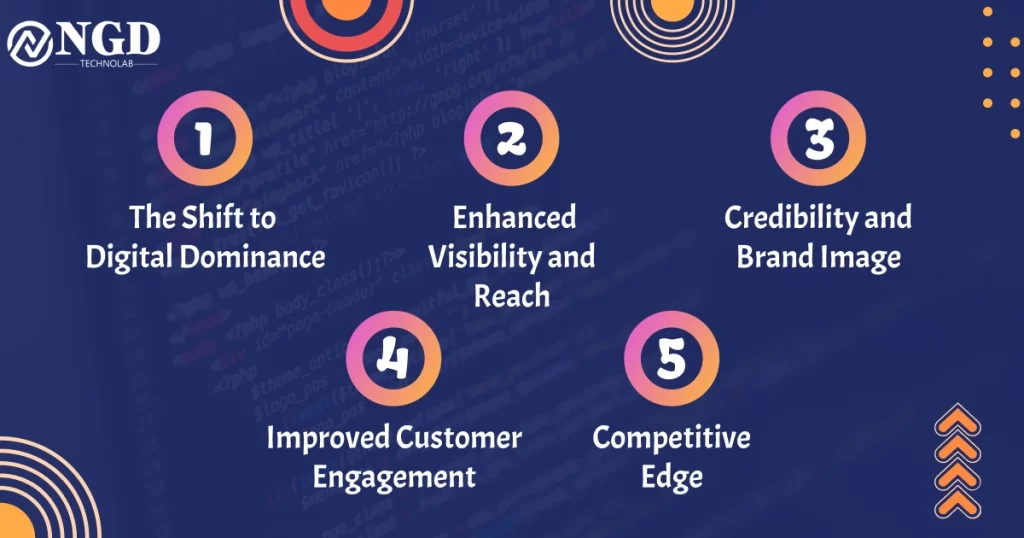What Are the Challenges of Digital Marketing for Small Businesses?
-
Harshid Patel

In today’s rapidly evolving business landscape, digital marketing has become a critical component for small businesses seeking to establish a strong online presence, reach a broader audience, and remain competitive. While digital marketing offers numerous opportunities, it also presents a unique set of challenges for small businesses. This article will delve into the various challenges that small businesses encounter in the realm of digital marketing and provide insights and strategies to overcome them.
1. Limited budget
One of the most prominent challenges small businesses face in digital marketing is limited financial resources. Unlike larger corporations, small businesses often operate on tight budgets, which can make it difficult to invest in paid advertising, hiring specialized marketing professionals, or implementing advanced marketing technologies. Inadequate funds may result in restricted reach and hinder the ability to compete effectively in the digital space.
Solution:
- Prioritize marketing initiatives: Allocate resources to the most effective and cost-efficient digital marketing channels.
- Invest in high ROI strategies: Focus on strategies with a proven track record of delivering a strong return on investment.
- Leverage free and low-cost tools: Utilize free or affordable digital marketing tools and platforms for email marketing, social media management, and SEO.
2. Limited time and resources
Small business owners often wear multiple hats and must juggle various responsibilities. This time constraint can limit their ability to devote sufficient time to digital marketing efforts, which require consistent attention and monitoring. Small business owners must balance marketing with other crucial aspects of their business.
Solution:
- Outsourcing: Consider outsourcing specific digital marketing tasks, such as content creation, social media management, or SEO, to professionals or agencies.
- Time management: Create a well-structured marketing plan, schedule regular updates, and automate repetitive tasks where possible.
- Employee training: Invest in training employees in digital marketing techniques to distribute the workload.
3. Target Audience Identification
Understanding and defining your target audience is essential for effective digital marketing. Small businesses often struggle to pinpoint their ideal customer profiles and may not have access to sophisticated market research tools. Without a clear understanding of their audience, their marketing efforts may fall short.
Solution:
- Conduct customer surveys: Gather feedback from existing customers to better understand their needs, preferences, and demographics.
- Analyze data: Utilize analytics tools to monitor website traffic, social media engagement, and other digital marketing metrics to gain insights into your audience.
- Research competitors: Study competitors in your industry to identify common customer characteristics and preferences.
4. Competition and saturation
The digital landscape is crowded, with numerous businesses vying for consumers’ attention. Small businesses often find themselves competing with larger, more established brands that have substantial marketing budgets. It can be challenging to stand out and get noticed amid this saturation.
Solution:
- Niche targeting: Focus on a specific niche within your industry to reduce competition and build a more loyal customer base.
- Content differentiation: Create unique, high-quality content that addresses the needs and pain points of your target audience.
- Build a strong online presence: Optimize your website for search engines (SEO) to improve your visibility in search results.
5. Content creation
Creating high-quality, engaging content is a fundamental aspect of digital marketing. Small businesses may struggle with content creation due to limited resources, including time, expertise, and equipment. Without compelling content, their digital marketing efforts may not yield the desired results.
Solution:
- Repurpose content: Maximize the value of your content by repurposing it for various platforms and formats, such as turning blog posts into videos or infographics.
- User-generated content: Encourage customers to create and share content related to your products or services, effectively turning them into brand advocates.
- Collaboration: Partner with influencers or other businesses to co-create content and extend your reach.
6. Keeping Up with Technology
Digital marketing tools, platforms, and algorithms are constantly evolving. Small business owners may struggle to keep up with the latest trends and technologies, leading to the risk of falling behind the competition.
Solution:
- Continuous learning: Invest time in staying updated with industry news, attending webinars, and taking online courses.
- Hire experts: Consider bringing in digital marketing experts or agencies with specialized knowledge in the latest trends and technologies.
- Test and adapt: Experiment with different strategies, track results, and adapt to changes in the digital landscape.
7. ROI Measurement
Measuring the return on investment (ROI) for digital marketing efforts can be challenging for small businesses. Without the proper tools and expertise, it’s difficult to gauge the effectiveness of different marketing strategies and allocate resources optimally.
Solution:
- Set clear goals: Define specific, measurable goals for each digital marketing campaign to assess its success.
- Use analytics: Implement analytics tools to track website traffic, conversion rates, and other relevant metrics to measure ROI.
- A/B testing: Conduct A/B tests to compare different marketing approaches and identify the most effective ones.
8. Social Media Management
Social media platforms are essential for connecting with customers and promoting small businesses. However, managing multiple social media accounts can be time-consuming and challenging, particularly for small business owners with limited resources.
Solution:
- Choose the right platforms: Focus on the social media platforms that are most relevant to your target audience and business niche.
- Use scheduling tools: Utilize social media scheduling tools to plan and automate posts, saving time and ensuring consistent engagement.
- Employee involvement: Encourage employees to participate in social media management and content sharing to increase your reach.
9. Search Engine Optimization (SEO)
Search engine optimization is crucial for improving a website’s visibility in search engine results. Small businesses often struggle to keep up with SEO best practices and may not have the expertise to optimize their websites effectively.
Solution:
- Learn SEO basics: Invest time in learning the fundamentals of SEO, or hire professionals to assist with SEO efforts.
- Regularly update content: Keep your website’s content fresh and relevant to improve its search engine rankings.
- Monitor competition: Analyze what your competitors are doing in terms of SEO and adjust your strategies accordingly.
10. Adapting to Algorithm Changes
Digital marketing platforms, such as social media and search engines, frequently update their algorithms. These changes can have a significant impact on a business’s visibility and success, making it essential for small businesses to adapt quickly.
Solution:
- Stay informed: Keep up to date with algorithm changes by following official announcements and industry news sources.
- Diversify strategies: Avoid reliance on a single platform or marketing channel. Diversify your efforts to reduce the impact of algorithm changes on your business.
- Test and optimize: Continuously test and adjust your strategies to maintain effectiveness in changing digital environments.
Conclusion
Digital marketing offers a wealth of opportunities for small businesses to grow and thrive in the online world. However, these opportunities come with a unique set of challenges, including limited budgets, time constraints, competition, and the need to keep up with rapidly evolving technologies. Small businesses can overcome these challenges by prioritizing their marketing efforts, understanding their audience, and leveraging cost-effective strategies. With determination, adaptability, and the right approach, small businesses can effectively navigate the digital marketing landscape and achieve success.
Frequently Asked Questions
A1. Content marketing, social media marketing, and email marketing are typically cost-effective options for small businesses. They allow you to reach a broad audience without a significant advertising budget.
A2. Small businesses can enhance their website’s search engine rankings through SEO optimization, quality content, responsive design, and building high-quality backlinks.
A3. Social media platforms offer a cost-effective way to engage with your audience, promote products or services, and build brand awareness. They allow small businesses to connect with their customers on a personal level.
A4. You can track the success of email marketing campaigns by monitoring metrics such as open rates, click-through rates, conversion rates, and ROI. Email marketing platforms provide analytics tools to help with this.
A5. Small businesses should implement data security measures, comply with relevant data protection regulations, educate employees on data privacy, and be transparent with customers about data handling practices.
Get Free consultation and let us know about your custom web and Mobile App project idea

Over 13+ years of work experience, we have built 210+ web and mobile apps
We can help you with
- Dedicated Developer
- delivering high-quality development
- Custom Mobile App Development
- Innovative Solution For Startups and Enterprise
Get Free consultation and let us know about your custom web and Mobile App project idea

Over 10 years of work experience, we have built 210+ web and mobile apps
We can help you with
- Dedicated Developer
- delivering high-quality development
- Custom Mobile App Development
- Innovative Solution For Startups and Enterprise
Latest Blogs
Explore the Latest Blogs on Trends and Technology.




